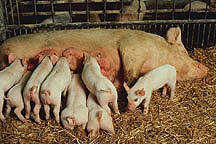This page has been archived and is being provided for reference purposes only. The page is no longer being updated, and therefore, links on the page may be invalid.
Tryptophan-enriched Diet Reduces Pig Aggression
By Sharon DurhamMarch 18, 2010
Feeding the amino acid tryptophan to young female pigs as part of their regular diet makes them less aggressive and easier to manage, according to a study by Agricultural Research Service (ARS) scientists and cooperators.
The tryptophan-enhanced diet reduced aggression and overall behavioral activity among young female pigs during the 8-month study. Tryptophan, which is only acquired through diet, is the precursor for the calming cerebral neurotransmitter serotonin. Keeping swine calm is important, because aggressive behavior can harm them and increase feed and medical costs for producers.
The study was done by ARS doctoral student Rosangela Poletto and animal scientist Jeremy Marchant-Forde at the ARS Livestock Behavior Research Unit in West Lafayette, Ind. Collaborators included biologist Heng-Wei Cheng at the ARS lab in West Lafayette, and Purdue University scientists Robert L. Meisel and Brian T. Richert.
The supplemented diet raised blood concentrations of tryptophan in 3-month-old females by 180 percent, and by 85 percent in 6-month-old females, resulting in calmer animals, mainly at the younger age. Persistent aggression in pigs can cause chronic stress, leading to poorer welfare, increased disease susceptibility and reduced growth and efficiency.
In the study, a diet with 2.5 times the normal amount of tryptophan was fed for one week to grower pigs (3 months old) and finisher pigs (6 months old). Another group of pigs received a normal diet. Behavioral activity and aggressiveness were measured before and after the seven days of diet supplementation.
To test aggression, researchers put an “intruder” pig in the pen until an aggressive interaction was triggered or for a maximum of five minutes. Pigs receiving the high-tryptophan diet showed less aggression—fewer attacked the intruder, and those that did attack were slower to do so—compared with the animals that didn’t get the supplement.
Pigs form social groups that, over time, form stable hierarchies or “pecking orders.” However, when new individuals are introduced, aggression is used to re-establish a new hierarchical order. If repeated changes in group composition occur, persistent aggression may arise, sometimes leading to physical injury and acute stress. A tryptophan-enriched diet may help producers avoid these problems, especially when groups of pigs are mixed together.
The research was published in the journal Applied Animal Behaviour Science.
ARS is the U.S. Department of Agriculture’s principal intramural scientific research agency. The research supports the USDA priority of promoting international food security.

